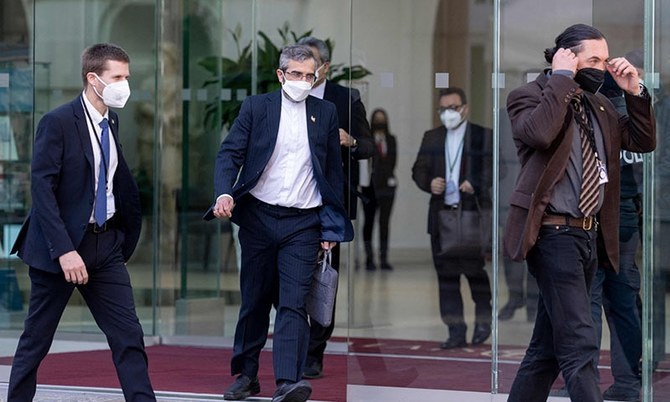
- ARAB NEWS
- 12 Jul 2025

While the Russia-Ukraine war has attracted the attention of the international community, the shadow war between the Iranian regime and Israel is escalating and increasing tensions in the region. The danger of the expanding shadow war between Iran and Israel is that it can spiral out of control, leading to a full-fledged war between the two countries.
In an unprecedented move, Israel reportedly destroyed hundreds of Iranian drones with an attack on an airbase near Kermanshah, in western Iran. The Iranian regime did not disclose the attack, most likely not to lose face or show weakness. The Nour news agency reported: “On Monday morning, a fire broke out in a stockroom where motor oil and other flammable materials were stored in one of the support bases of the Revolutionary Guards in the Mahidasht region of Kermanshah province, causing damage to an industrial shed.”
To project power and appease its hardline base, the regime always attempts to take immediate revenge; Tehran responded by launching a dozen missiles into Iraq’s Kurdish region, arguing that it was aimed at Israeli centers. A “strategic center for conspiracy and mischief of the Zionists was targeted by powerful precision missiles fired by the Islamic Revolutionary Guards Corps,” the IRGC said in a statement.
Irbil Gov. Omed Khoshnaw stated that there are no Israeli sites in the area. Instead, a new building housing the US Consulate was targeted. “We’ve been hearing for some time that Israeli sites are present. These are baseless allegations. There are no Israeli sites in the region,” Khoshnaw said.
To retaliate against Israel, the Iranian regime does not have to directly attack Israeli sites. Instead, Tehran can aim at the US, a robust ally of Israel, to force Washington to pressure Israel and to send a strong message to the US and Israel that both can be targets of Iran’s retaliation.
The Iranian regime possesses thousands of missiles that can strike Israeli or American sites. The commander of the US Central Command Gen. Kenneth McKenzie told the Senate Armed Services Committee: “At a military level, my concern is — first of all — that they do not have a nuclear weapon, but I am also very concerned about the remarkable growth and efficiency of their ballistic missile program. They have over 3,000 missiles of various types, some of which can reach Tel Aviv.”
The Iran-Israel shadow war has also been escalating in another country: Syria. Recently, Israel carried out an airstrike in Syria that killed four people, including two IRGC officers. Iran’s state-controlled Sepah News, which is connected to the IRGC, warned that Israel would “pay for this crime” and identified the two Iranians killed as Gen. Ehsan Karbalaipour and Gen. Morteza Saeidnejad.
There exist several underlying issues behind the expanding shadow war between the Iranian regime and Israel. The most important issue is related to Iran’s nuclear program and the revival of the nuclear deal. Despite the Iranian leaders’ claim that their nuclear program is designed for peaceful purposes, from the Israeli government’s perspective, the Iranian regime is pursuing a covert agenda to obtain nuclear weapons.
The Israeli leaders’ concern is warranted due to the Iranian government’s history of clandestine nuclear activities. Tehran, from the beginning, decided to conceal its nuclear activities. For instance, its clandestine nuclear activities at two major sites, Natanz and Arak, were first revealed in 2000 by an Iranian opposition group, the National Council of Resistance of Iran.
Israel is concerned about the severe consequences of the Iranian nuclear deal and Tehran’s increasing influence in Syria, Lebanon and Iraq.
Dr. Majid Rafizadeh
In 2017, the council also released critical information showing that Iran’s nuclear activities had continued at the highly protected Parchin military base. The group stated that a location at Parchin was being secretly used to continue the country’s nuclear weapons project. It said: “The unit responsible for conducting research and building a trigger for a nuclear weapon is called the Center for Research and Expansion of Technologies for Explosion and Impact, known by its Farsi acronym as METFAZ.”
In addition, Israel’s seizure of documents from a nuclear archive in Tehran in 2018 directly pointed to the military dimension of Iran’s nuclear program. The Institute for Science and International Security subsequently warned: “Iran intended to build five nuclear warheads, each with an explosive yield of 10 kilotons and able to be delivered by ballistic missile.”
Israel is also concerned that the nuclear deal will not only relieve the Iranian regime financially but will fail to prevent the regime from advancing its nuclear program. Secondly, the nuclear deal will provide Tehran with the money it desperately needs to empower and embolden its proxy group in Iraq, Yemen, Lebanon and Syria.
In a nutshell, Israel is concerned about the severe consequences of the Iranian nuclear deal and Tehran’s increasing influence in Syria, Lebanon and Iraq. This has led to the expanding shadow war between the Iranian regime and Israel, which risks spiraling out of control and leading to full-fledged war.